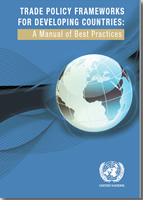
Trade policymaking is a challenging task in all countries and presents especially great difficulties for officials in developing countries.
What may seem at first to be a purely external exercise is intimately related to development policy as a whole and involves a series of domestic trade-offs.
To make policy in this field, the interests of consumers and producers must be balanced while the goals of the most efficient and export-oriented industries must be weighed against those that are still struggling to achieve competitiveness.
When deciding what kinds of activities they will tax or incentivize, or what trade agreements they are prepared to negotiate, and what sort of tariff concessions they are willing to make, policymakers have always had to reconcile the fiscal needs of the treasury with the potential for job creation.
Matters have become more complicated with the ever-widening range of issues that are brought to the negotiating table and by the proliferation of those tables. The many demands that are made upon trade policymakers in this new environment dwarf the problems that their predecessors once faced, being technically more complex and politically more intractable.
Just as no smart traveller would go on a journey without a road map, policymakers in this field are well advised to have a reasoned plan that guides their actions.
A trade policy framework (TPF) offers a structure for the many decisions that a country’s negotiators, legislators, and litigators must make as they devise and implement policy. The aims of a TPF are to reveal the principal challenges that a country faces in its trade policy, prioritize its objectives, and lay out a plan to achieve those goals.
A country’s decision to seek assistance in the development of a TPF is most commonly triggered by the realization that it has been underperforming its expectations in the external sector and that assistance is needed to identify the bottlenecks and propose ways to break through them. UNCTAD provides technical assistance to countries in the development of their TPFs.
The purpose of this manual is to provide guidance in the development of a TPF. It is based largely on the lessons learned from the TPFs, as well as comparative data on the challenges and experiences of developing countries as a group.
The manual seeks to situate trade policy as a branch of development policy.




